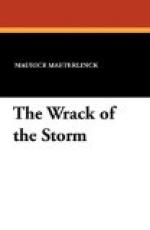* * * * *
THE MIGHT OF THE DEAD
XXII
THE MIGHT OF THE DEAD
1
In A Beleaguered City, a little book which, in its curious way, is a masterpiece, Mrs. Oliphant shows us the dead of a provincial town suddenly waxing indignant over the conduct and the morals of those inhabiting the town which they had founded. They rise up in rebellion, invest the houses, the streets, the market-places and, by the pressure of their innumerable multitude, all-powerful though invisible, repulse the living, thrust them out of doors and, setting a strict watch, permit them to return to their roof-trees only after a treaty of peace and penitence has purified their hearts, atoned for their offences and ensured a more worthy future.
There is undoubtedly a great truth beneath this fiction, which appears too far-fetched because we perceive only material and ephemeral realities. The dead live and move in our midst far more really and effectually than the most venturesome imagination could depict. It is very doubtful whether they remain in their graves. It even seems increasingly certain that they never allowed themselves to be confined there. Under the tombstones where we believe them to lie imprisoned there are only a few ashes, which are no longer theirs, which they have abandoned without regret and which, in all probability, they no longer deign to remember. All that was themselves continues to have its being in our midst. How and under what aspect? After all these thousands, perhaps millions, of years, we do not yet know; and no religion has been able to tell us with satisfying certainty, though all have striven to do so; but we may, by means of certain tokens, hope to learn.
Without further considering a mighty but obscure truth, which it is for the moment impossible to state precisely or to render palpable, let us concern ourselves with one which cannot be disputed. As I have said elsewhere, whatever our religious faith may be, there is in any case one place where our dead cannot perish, where they continue to exist as really as when they were in the flesh and often more actively; and this living abiding-place, this consecrated spot, which for those whom we have lost becomes heaven or hell according as we draw close to or depart from their thoughts and their desires, is in us.
And their thoughts and their desires are always higher than our own. It is, therefore, by uplifting ourselves that we approach them. It is we who must take the first steps, for they can no longer descend, whereas it is always possible for us to rise; for the dead, whatever they have been in life, become better than the best of us. The least worthy of them, in shedding the body, have shed its vices, its littlenesses, its weaknesses, which soon pass from our memory as well; and the spirit alone remains, which is pure in every man and able to desire only what is good. There are no wicked dead because there are no wicked souls. This is why, as we purify ourselves, we restore life to those who were no more and transform our memory, which they inhabit, into heaven.




